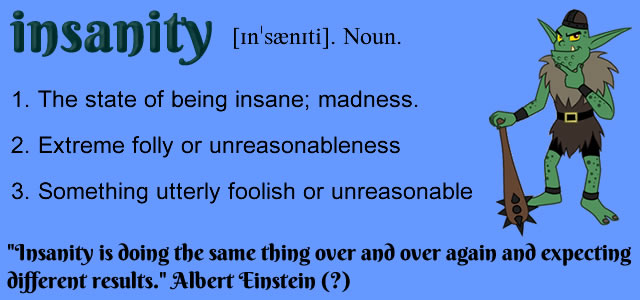
Albert Einstein supposedly said:
“The definition of insanity is doing the same thing over and over again and expecting a different result.”
It sounds like something he might have said, but there’s no evidence that he did. According to Quote Investigator®, the most likely source of this saying is a Narcotics Anoymous pamphlet published in November 1981, in which they say:
“Insanity is doing the same thing over and over again and expecting different results.”
Here something that Einstein did actual say that has a somewhat similar meaning:
“We cannot solve our problems with the same thinking we used when we created them.”
He also said:
“Learn from yesterday, live for today, hope for tomorrow. The important thing is not to stop questioning.”
Another quotation that I came across the other day that has a related meaning is:
“a foolish consistency is the hobgoblin of little minds”
This appears in Self Reliance, an essay by Ralph Waldo Emerson that was published in Essays: First Series in 1841. Here’s a longer version:
“A foolish consistency is the hobgoblin of little minds, adored by little statesmen and philosophers and divines. With consistency a great soul has simply nothing to do. He may as well concern himself with his shadow on the wall. Speak what you think now in hard words, and to-morrow speak what to-morrow thinks in hard words again, though it contradict every thing you said to-day.”
Apparently he meant this as criticism of a refusal to change one’s mind or adjust one’s position in light of new facts or different situations.
So what is an actual definition of insanity?
Here are a few:
- The state of being insane; madness.
- Unsoundness of mind or lack of the ability to understand that prevents someone from having the mental capacity required by law to enter into a particular relationship, status, or transaction or that releases someone from criminal or civil responsibility (law)
- Extreme folly or unreasonableness
- Something utterly foolish or unreasonable
Insanity is a combination of in- (not), sane and -ity (the state of). It comes either from Latin insānus (unsound in mind, mad, insane) and -itās; or from in- (lacking, without), sanitās (health, sanity). Insānus and sanitās both come from sānus (sound, sane, well, correct), possibly from PIE *seh₂-no-, from *seh₂- (to satisfy), or from PIE *swā-n- (healthy, whole, active, vigorous).
Incidentally, what is a hobgoblin when it’s at home?
- A small, ugly goblin that makes trouble for humans. [from 1520s]
- A source of dread, fear or apprehension; a bugbear.
From hob (elf, from Hob, a variant of Rob, short for Robin Goodfellow, an elf in German folklore), and goblin (a malevolent and grotesque diminutive humanoid).
In some of the stories I read, such as Wandering Inn, hobgoblins are larger varieties of goblins, and don’t always make trouble for humans, and are not a source of dread, fear or apprehension for those who get to know them.
Sources:
https://www.inc.com/kevin-daum/26-genius-quotes-from-albert-einstein-that-will-make-you-sound-smarter.html
https://en.wikipedia.org/wiki/Wikipedia:Emerson_and_Wilde_on_consistency
https://en.wiktionary.org/wiki/insanity
https://en.wiktionary.org/wiki/sanus#Latin
https://www.merriam-webster.com/dictionary/insanity
https://en.wiktionary.org/wiki/hobgoblin


